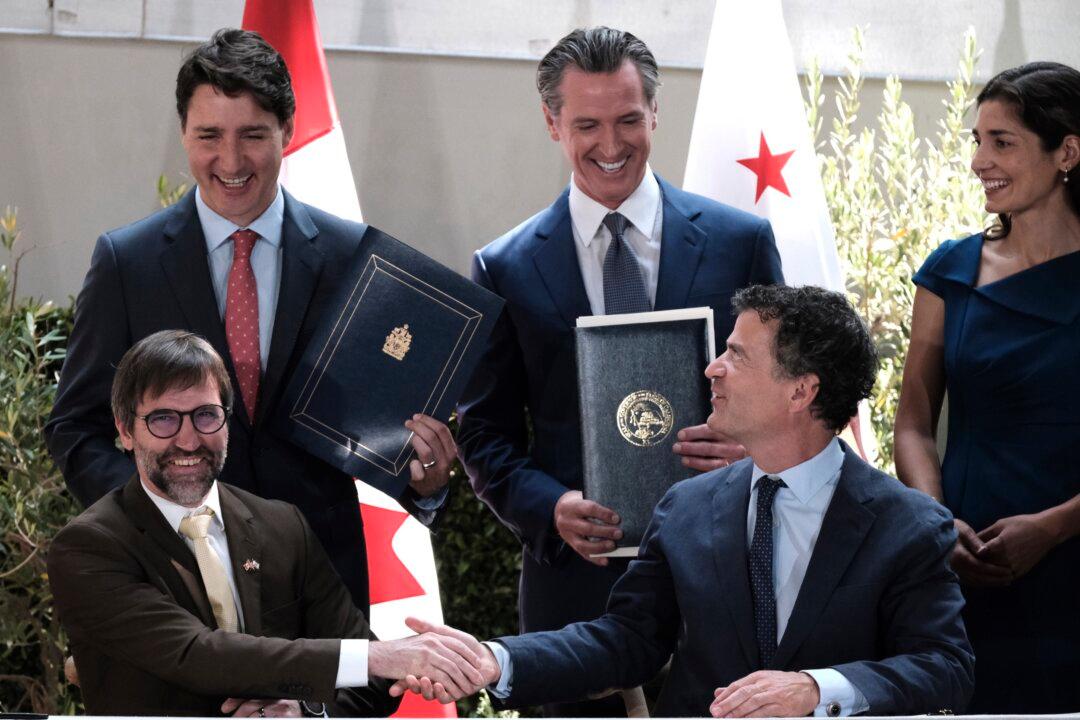The most persistent trend adding to inflation is the transition to “green energy,” which “raises costs,” according to a new Bank of Canada staff discussion paper.
“The 2021–22 Surge in Inflation” says that Canada has undergone the most pronounced surge in inflation in the 2021–2022 fiscal year since the 1970s.
A dollar in 1970 was equivalent to about $7.44 in purchasing power today, according to the Canada Inflation Calculator, based on Statistics Canada consumer price index (CPI) data.
This is an increase of $6.44 over 53 years. And it means that today’s prices are on average 7.44 times as high as prices were in 1970, and that a dollar in 2023 only buys 13.44 percent of what it was able to buy in 1970.
“In late 2022, inflation in Canada and other countries remained too high,” said the BoC paper. It noted that core inflation measures for Canada in September 2022 ranged from 4.7 percent to 6 percent, with October 2022 CPI inflation at nearly 7 percent (6.9 percent).
“The slowest but perhaps the most persistent trend is associated with the ongoing transition from fossil fuels to green energy,” said the paper.
“The transition requires an immense reallocation of investments, which raises costs due to higher demand for new investments and lack of investment supply into fossil fuel production,” said the central bank.
The paper said the cost pressures are exacerbated by “the long time required to build green energy infrastructure, further boosting prices for fossil fuels,” which results in higher energy prices.
This will also “contribute to challenges for monetary policy to keep inflation on target over the long term,” said the paper.
It attributed much of inflation to the pandemic, stating that overall the pandemic accelerated structural changes in the goods and labour markets and that these changes are likely to put pressure on prices and wages “in the medium and long term.”
Blacklock’s Reporter noted that the report did not provide dollar values or quantify the impacts of the federal government’s climate change program on the CPI. It said cabinet has not disclosed the impacts on consumers as a result of limiting their use of gasoline, oil products, propane, natural gas, diesel, or aviation fuel.
Net Zero will be ‘Painful,’ says Liberal MP
Ontario Liberal MP Ryan Turnbull told the House of Commons on June 6, 2022, during debate on a budget bill, that achieving net zero would require Canadians to “switch our lifestyles.” He acknowledged that it would be “painful at times” and said the government’s budget plan was “driven by our national price on pollution.”
“Achieving net zero is not going to be easy, that’s for sure,” Turnbull said.
“It will require all of us at every level across every industry on behalf of families and members of the general public,” added the MP.
By 2030, the federal carbon tax is expected to reach 40 cents per litre of gasoline, from its current equivalent of 12 cents per litre. Carbon taxes will continue to be added on other fuels, adding 27 cents on the price per litre of propane, 34 cents per cubic metre of natural gas, 44 cents per litre of aviation fuel, and an additional 47 cents per litre for diesel.
A 2021 briefing note titled “Pricing Carbon Pollution,” produced by the Department of Environment, contradicted Turbull’s suggestion that the Liberal government’s climate plan would be tough on Canadians.
“Canada has proven that carbon pricing can be done in a manner that keeps life affordable,” according to the briefing note.
A separate 2021 government report, titled “A Distributional Analysis of Federal Carbon Pricing,” produced by the Parliamentary Budget Officer, said that for most Canadian households, carbon taxes exceed any rebates given by the federal government through climate action incentive payments. And higher-income households continue to see larger net costs, said the report.
The report estimates that by 2030–31, that net loss per household will average $2,282 a year for Albertans, $1,464 for Saskatchewan residents, $1,461 for Ontarians, and $1,145 for Manitobans.
The report also estimated that, rather than saving money, carbon pricing would also cost the government, increasing the budgetary deficit by $0.9 billion in 2021–22, and ultimately by $5.2 billion in 2030–31.





